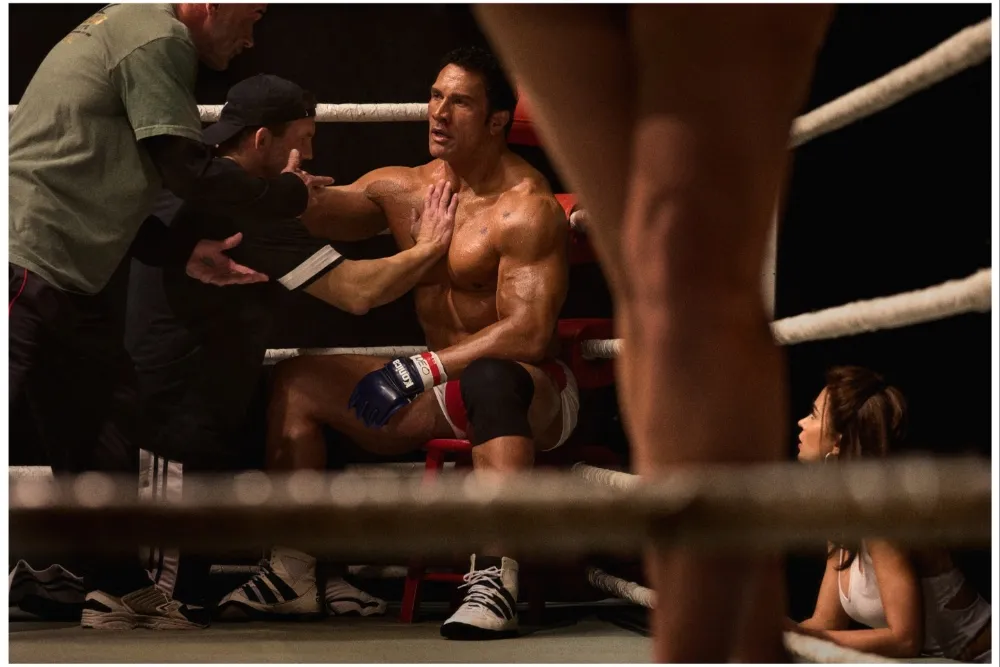
Introduction: A New Dawn for The Rock
August 2025 finds Dwayne Johnson not on the red carpet, not pumping iron, but weighed down by something deeper—grief, truth, reinvention. His new film, The Smashing Machine, premiered with a 15-minute standing ovation at the Venice Film Festival, leaving audiences and Johnson himself in tears. This isn’t just a movie—it’s a transformation so raw it might just redefine the trajectory of an entire career.
At a glance: Johnson’s startling physical weight loss, his full immersion into a frail and haunted MMA legend, the dismantling of his blockbuster persona… and here we are, watching a star reborn through vulnerability. The Smashing Machine isn’t just trending—it’s becoming a cultural turning point.
What’s Inside The Smashing Machine
From Reality to Reel
Based on the 2002 HBO documentary of the same name, The Smashing Machine is a biopic about Mark Kerr—a two-time UFC heavyweight champion who destroyed opponents and then struggled to hold together his own life.
Directed by Benny Safdie (known for Uncut Gems), with Emily Blunt portraying Kerr’s girlfriend Dawn Staples, and featuring real MMA fighters like Oleksandr Usyk, the film is a gritty portrait of triumph and trauma. What resonates isn’t just the fights—it’s the addiction, the breakdowns, the human cost of being “the best.
A Tour De Force Performance
Johnson’s transformation is so complete—prosthetics, weight loss, emotional breakdowns—that critics liken his performance to Mickey Rourke in The Wrestler or Brendan Fraser in The Whale. It’s been called “a revelation.”
This isn’t the muscle-bound charisma Johnson built his brand on; it’s soul laid bare.
The Physical and Emotional Transformation
Weight Let Go, Truth Gained
At the Venice screening, fans were stunned by Johnson’s lean frame—rumored to be about 60 pounds lighter—prompting worries about his wrestling future.
But this transformation was born from something more than movie prep—it was a gut-related health crisis. Johnson described it as a “data, not noise” journey: rebuilding fitness from health foundations, not flexing.
By choosing inner wellbeing over external optics, he redefined what being “fit” means in Hollywood.
Emotional Cost and Cultural Gravity
Johnson revealed the project allowed him to ask existential questions about his own dreams. Interviewed on the Venice carpet, he said portraying Kerr pushed him to challenge his identity—not just as “The Rock,” but as a human being.
That longing for meaning echoes in Kerr’s own story where fame, addiction, love, and regret collide. Johnson’s tears at the standing ovation didn’t just belong to the character—they were his own.
A Career Recalibration for Johnson
Reinventing The Rock
Once untouchable in action and family films, Johnson admits he shied away from complex roles. Now he sees that avoidance limited him. The Smashing Machine is his reckoning—and it’s already drawing Oscar talk.
It’s a calculated risk. A shift from box office pyrotechnics to quiet ruin—and that is performance art.
A24’s Strategic Choice
Within A24’s slate—alongside Denzel Washington’s Highest 2 Lowest and Timothée Chalamet’s Marty Supreme—The Smashing Machine stands out as brutal, honest, unflinching. It’s not easy to sell grieving, flawed champions—but when done right, the reflection becomes a mirror.
Broader Questions Stirred by This Film
- How do we treat our champions offstage? Kerr’s story is a cautionary tale about worship without empathy.
- Can Hollywood honor imperfection? In turning away from triumph porn, The Smashing Machine shows medals don’t equal closure.
- Can stars grow by shrinking? Johnson’s fragility here may be the bravest thing he’s ever done, and it invites other celebrities to lean into the messy.
Conclusion: Where Courage Meets Context
The Smashing Machine isn’t just about Mark Kerr. It’s a prayer and a dare.
It’s a plea to honor complexity over spectacle—and proof that even icons can find freedom by looking inward.
By reshaping himself, Johnson didn’t just shed weight—he may have shed his Hollywood skin. And for that, our eyes—and expectations—have to change too.
So here’s the moment I want us to sit in: will audiences follow The Rock when he abandons the roar for the whisper?
Let me know what resonates with you: is Johnson’s transformation thrilling—or unnerving?










